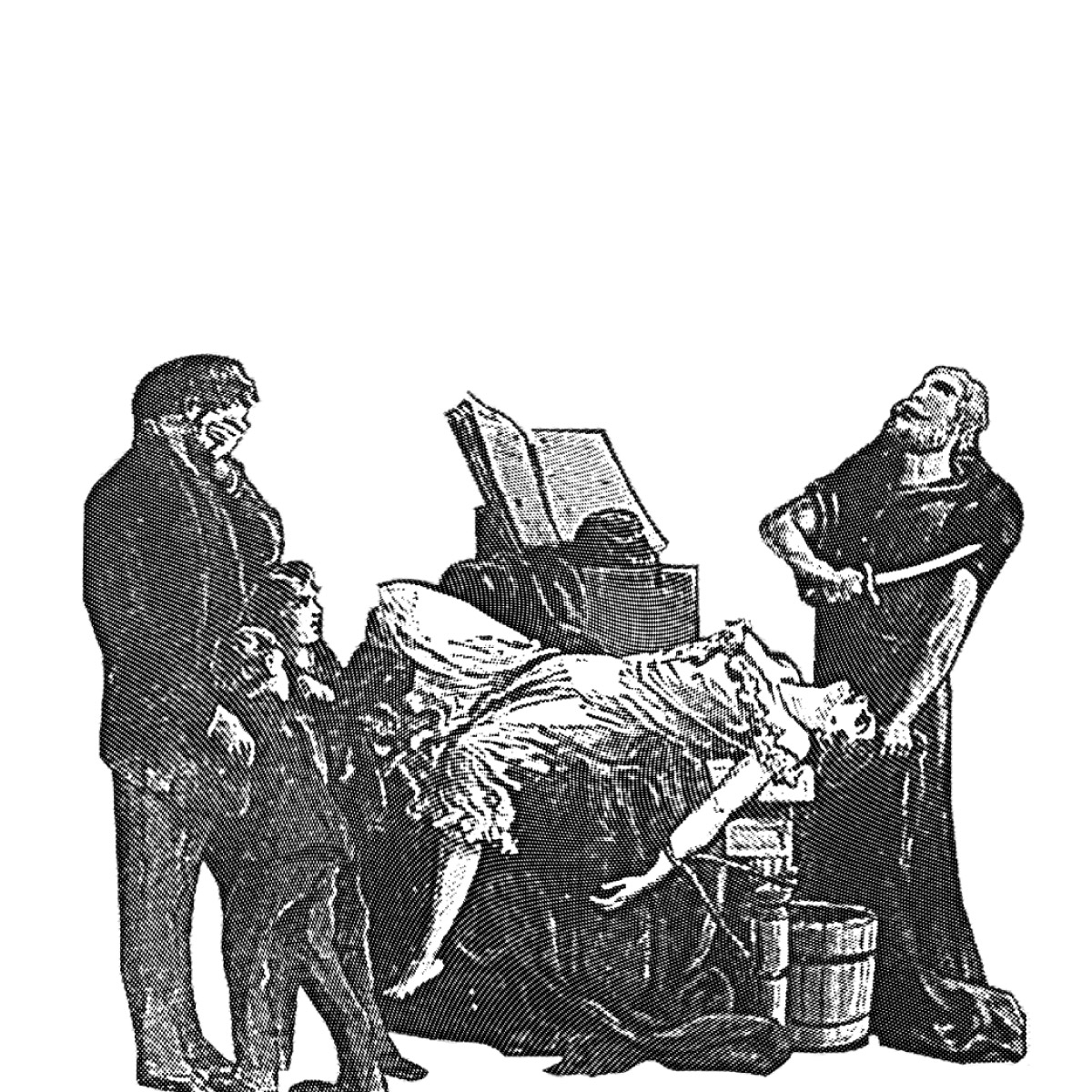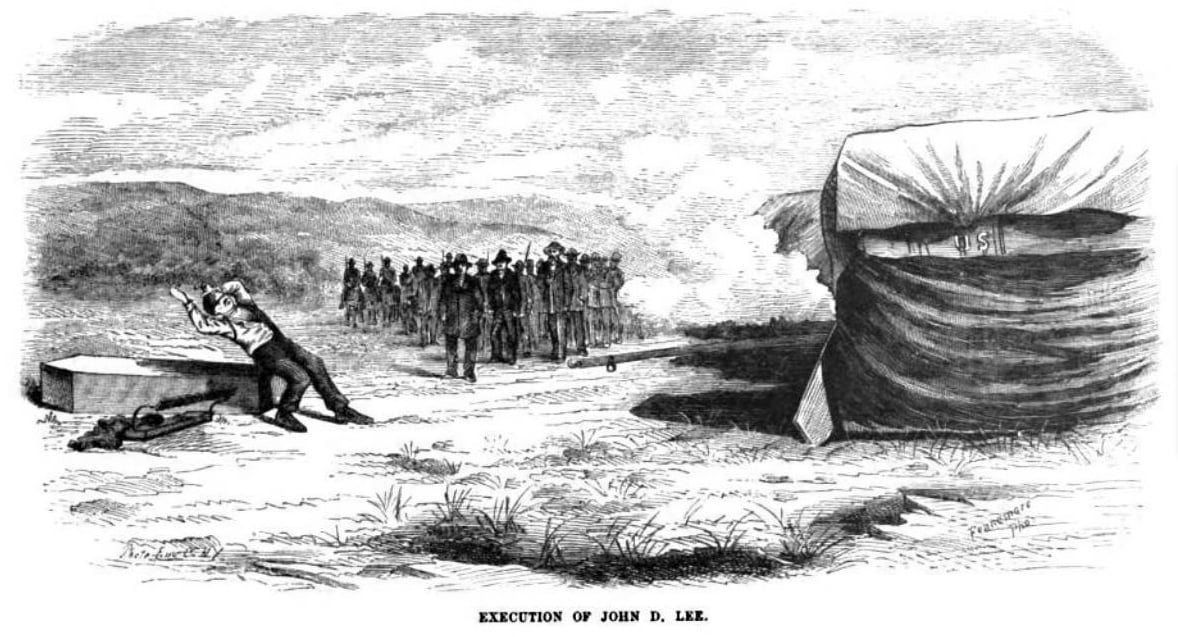Blood Atonement and Capital Punishment

What is blood atonement?
It is the belief that Jesus did not atone for certain types of sins,[1] so the sinner must atone for these sins by voluntarily being killed.[2] This was first taught[3] by Church leaders in the mid-1850s but was never put into practice.[4] Blood atonement is often associated with capital punishment.[5]
Doesn't this fundamentally contradict the idea that all sins are atoned by the blood of Christ?
Yes.
Does the Church still teach this?
No. The Church denounced this teaching in 1889,[6] and again most recently in 2010.[7]
Timeline of Blood Atonement Teachings
Reformation Era[8]
March 3, 1849
February 5, 1852
1854–1859
Various Church leaders make public statements related to "blood atonement."[11]
Post Reformation[12]
1873–1877
Critics of the Church publish books that accuse the Saints of practicing blood atonement by killing apostates of the Church.[13]
April 30, 1877
In an interview, Brigham Young responds that he does believe in blood atonement.[14]
January 1884
December 14, 1889
The First Presidency issues a statement that denounces the rumor that the Church believes in killing apostates.[16]
Modern Era[17]
1954–1958
June 18, 2010
The Church publishes a statement denouncing blood atonement.[20]
May 2025
The Church publishes an article that says blood atonement is not doctrine.[21]
Is blood atonement the same thing as capital punishment?
Sometimes, it seems. Some Church leaders taught that under a religious form of government blood atonement could be practiced as a form of capital punishment.[22] However, this was never put into practice.[23]
Timeline of Capital Punishment as it related to Blood Atonement
Capital Punishment
March 4, 1843
January 19, 1851
State of Deseret criminal code is passed into law which directs murderers to be executed by firing squad, hanging, or beheading.[25]
March 23, 1877
April 30, 1877
While answering a question on blood atonement, Brigham states that capital punishment for "offenses deserving death" should be done "by the shedding of blood instead of by hanging."[28]
December 14, 1889
The Church releases a statement denying the claim that apostates are killed by the Church but supporting the civil and legal process as it relates to capital punishment.[29]
March 15, 2004
Utah removes firing squads as a possible execution method in most instances.[30]
March 23, 2015
Utah reinstates firing squads as an execution method when lethal injection is not available.[31]
Did Joseph Smith teach blood atonement?
No, probably not. There are no contemporary records of him teaching something like this. However, there are records that indicate that Joseph Smith favored capital punishment[32] and gave the example of Peter killing Judas.[33]
When was blood atonement first taught?
The earliest indication of blood atonement was in the March 3, 1849 minutes of the Council of the Fifty,[34] but the earliest explicit teaching was from Apostle Jedediah Grant in 1854.[35] Brigham Young and other Church leaders began teaching this principle after 1855[36] during what historians refer to as the "Mormon Reformation" period.[37] Scholars have characterized this period as one where Church leaders used fiery rhetoric in hopes that it would prompt repentance or cause people to voluntarily leave Utah if they would not abide by the teachings of the Church.[38]
Was the practice of blood atonement ever Church policy?
No. Historical records indicate that although the idea of blood atonement was taught, Church leadership specifically stated that it should not be practiced.[39]
For example, in 1856, when specifically asked if a man should be killed to atone for his fornication, Brigham said he should instead be rebaptized for his sins.[40] This was consistent with other contemporary letters from his private correspondence.[41] Additionally, in 1857, Brigham pardoned a Latter-day Saint soldier who was going to be executed for bestiality.[42]
Was it practiced by individuals?
Probably. There are purported accounts of killings related to blood atonement by members of the Church.[43]
Related Question
Did the Lafferty brothers commit murders and claim it was done as blood atonement?
Read more in Under the Banner of Heaven—Jon Krakauer and Dustin Lance Black
Why did Church leaders teach that it shouldn't be practiced?
Brigham and Jebediah Grant taught that it would be implemented at some point in the future.[44] Charles Penrose taught that "because of the laws of the land, and the prejudices of the nation, and the ignorance of the world, this law cannot be carried out."[45]
Wasn't John D. Lee put to death for the Mountain Meadows Massacre and wasn't that an example of blood atonement?
Yes, arguably. John D. Lee was convicted in federal court and sentenced to death in 1876 for his role in the Mountain Meadow Massacre.[46] In his last written confession, Lee implied his execution was a form of blood atonement,[47] though scholars dispute whether the writings published after his death were fully his.[48] When Brigham Young was asked about his execution, he also implied that this was a form of blood atonement.[49]

Is blood atonement ever taught in the scriptures?
Not specifically, though capital punishment has been referenced in multiple scriptures, specifically for murder (see below).
Scripture | Text |
Genesis 9:6[50] | Whoso sheddeth man's blood, by man shall his blood be shed: for in the image of God made he man. |
JST Genesis 9:12–13[51] | And whoso sheddeth man’s blood, by man shall his blood be shed; for man shall not shed the blood of man. For a commandment I give, that every man’s brother shall preserve the life of man, for in mine own image have I made man. |
Numbers 35:16–19[52] | And if he smite him with an instrument of iron, so that he die, he is a murderer: the murderer shall surely be put to death. And if he smite him with throwing a stone, wherewith he may die, and he die, he is a murderer: the murderer shall surely be put to death. Or if he smite him with an hand weapon of wood, wherewith he may die, and he die, he is a murderer: the murderer shall surely be put to death. |
2 Nephi 9:35[53] | Wo unto the murderer who deliberately killeth, for he shall die. |
Alma 1:13–14[54] | And thou hast shed the blood of a righteous man, yea, a man who has done much good among this people; and were we to spare thee his blood would come upon us for vengeance. Therefore thou art condemned to die, according to the law which has been given us by Mosiah, our last king; and it has been acknowledged by this people; therefore this people must abide by the law. |
Alma 1:18[55] | And they durst not steal, for fear of the law, for such were punished; neither durst they rob, nor murder, for he that murdered was punished unto death. |
Alma 34:12[56] | But the law requireth the life of him who hath murdered; therefore there can be nothing which is short of an infinite atonement which will suffice for the sins of the world. |
D&C 42:18–19[57] | And now, behold, I speak unto the church. Thou shalt not kill; and he that kills shall not have forgiveness in this world, nor in the world to come. And again, I say, thou shalt not kill; but he that killeth shall die. |
Was blood atonement ever part of the temple endowment ceremony?
No. However, the endowment ceremony reportedly contained death penalties for revealing parts of the ceremony[58] as well as a promise to pray for God to avenge Joseph Smith's death.[59] Critics of the Church have asserted that the penalties had been enacted on occasion.[60]
Did some members of the Church commit acts of violence because of this teaching?
Yes, probably. There are several documented incidents of violence that critics have alleged were instances of blood atonement.[61]
Did the Church ever issue any official statement on blood atonement?
Yes. In 2010, the Church published a statement stating that "so-called 'blood atonement,' by which individuals would be required to shed their own blood to pay for their sins, is not a doctrine of The Church of Jesus Christ of Latter-day Saints."[62] It was reiterated in an article published on the Church website in 2025.[63]
Much earlier, in 1889, the Church issued a statement that condemned vigilante justice and denied that the murder of apostates by the Church had ever occurred, but affirmed that capital punishment was acceptable to God and urged Church members to follow the rule of law.[64] However, the statement did not specifically refer to blood atonement by name.[65]
Is blood atonement the reason that Utah used the firing squad as a method for capital punishment?
Probably. Early Church leaders taught that shedding blood was an important part of capital punishment,[66] and this could have influenced the development of the laws in Utah.[67]
George A. Smith[BIO] wrote an early draft of what would later become Utah's criminal code and is known to have discussed capital punishment with Joseph Smith.[68]
Does Utah still use the firing squad as a means of capital punishment today?
Yes. In 2015, the Utah State Legislature passed H.B. 11 which allows for the firing squad to be used as a means of execution if lethal injection is unavailable.[69] This was upheld on December 22, 2023, by Judge Coral Sanchez of Utah’s Third Circuit Court.[70]
- Lane P.
“In 1858~9, Amasa Lyman preached in S. Utah that Blood Atonement should not be practiced. The only explanation for him to emphasize this issue was that he had learned that one cause for the MMM was the recent 1856~7 teachings of Blood Atonement.” - Lane P.
“The fact is both Brigham Young and his followers were well aware of Blood Atonement and the potential need in certain situations. In this letter from Isaac C. Haight to Brigham Young, Isaac specifically asks if Blood Atonement was required in a certain case.” - Spencer M.
“I'm grateful that we have a living church which can shrug off distasteful doctrines like this and grow beyond them. We can attribute blood atonement, like several other controversies, to speculation from early church members. We don't have to hang onto it or justify it.” - M.B.
“I read up on Blood Atonement in Mormon Doctrine and to my understanding, the shedding of blood is the restitution part of the repentance cycle. If you steal, you return what you stole. How else does one make restitution for the taking of a life?” - David G.
“For me, it is not hard to imagine that if I killed a man, part of repentance would be to submit myself to the punishment associated with my crime. In the case of murder, the punishment is death. If I refuse to repent, the Lord cannot redeem me.”



 about this topic
about this topic